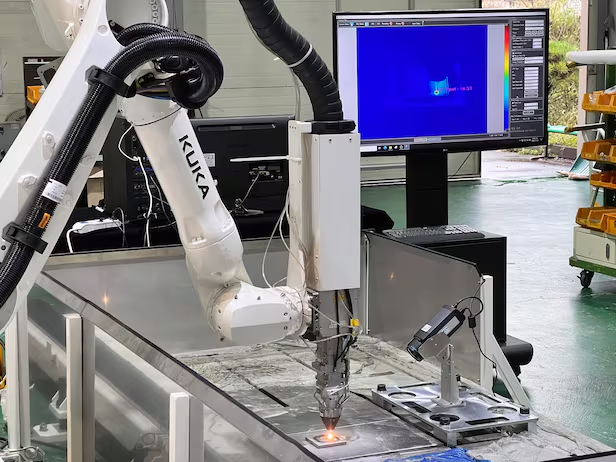A team of South Korean researchers has developed an AI-enabled module designed to improve defect detection and optimization in metal 3D printing. This innovative module, which functions as an add-on component, can be integrated with existing factory equipment to autonomously identify defects and optimize production conditions without requiring expensive hardware upgrades.
The research, led by Yoo Se-hoon and Lee Ho-jin from the Korea Institute of Industrial Technology, focuses on transforming traditional manufacturing setups into AI-powered smart factories. Their technology, called “Metal 3D Printing Defect Detection and Active Control Technology,” monitors production processes in real time and adjusts settings automatically, making it suitable for industries using older equipment.
Improving DED 3D Printing
The AI module has been tested with Direct Energy Deposition (DED) 3D printing, a method where a high-energy laser melts and deposits metal powder or wire layer by layer. DED systems are prone to defects caused by variations in laser output, stacking speed, and powder supply.
The module detects anomalies during the printing process, alerts operators, and actively adjusts parameters to maintain optimal conditions. Unlike traditional systems that rely on operator experience for troubleshooting, this smart module autonomously identifies and resolves errors, reducing downtime and enhancing production efficiency.
Moving Toward Commercialization in Defect Detection
The technology has already been transferred to domestic companies MR Tech and Dico for commercialization. It is expected to support industries such as aerospace, medical, and automotive manufacturing.
Moon Chang-kyu, head of MR Tech, highlighted the module’s potential for robot-based production processes, while Dico CEO Hwang Jun-cheol emphasized its ability to capture and analyze temperature data using video systems. This capability also makes it ideal for implementing digital twin models to simulate and monitor production processes.
Advancing Smart Manufacturing
This AI module represents a major step toward smarter manufacturing, enabling businesses to upgrade to AI-based automation and real-time monitoring without replacing existing machinery. With its ability to improve defect detection, optimize performance, and reduce manual intervention, this technology signals the future of AI-driven production systems.
Original Source

